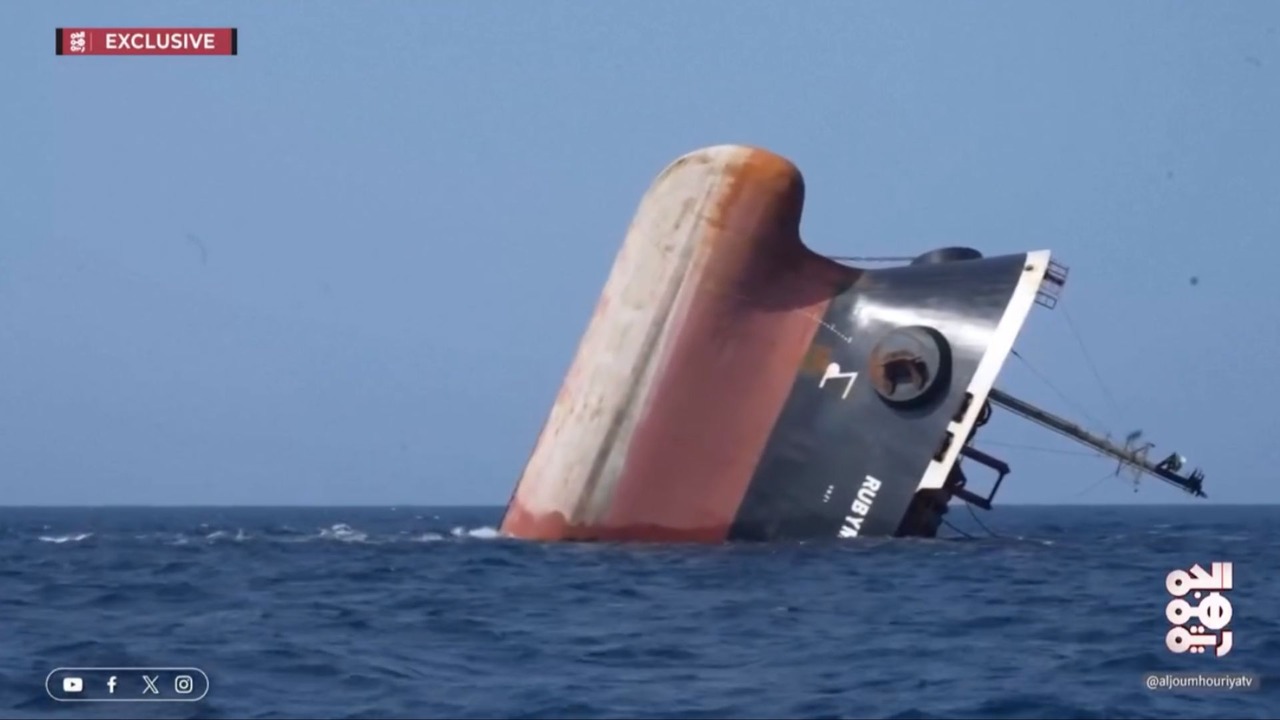Sunken ship (Photo: Reproduction @aljoumhouriyatv)
Vessel transported 22 thousand tons of toxic fertilizers
A vigorous fishing industry, some of the largest coral reefs in the world, desalination plants that provide drinking water to millions of people. All of this is under threat from the spill of large quantities of oil and fertilizer into the Red Sea following the sinking of a cargo ship attacked by Yemen's Houthi rebels.
Authorities reported on Saturday that the M/V Rubymar, a Belize-flagged ship believed to be carrying 22,000 tons of toxic fertilizer, sank after taking on water in the February 18 attack.
Even before plunging into the depths of the ocean, the vessel was already leaking heavy fuel, which caused a 30km oil slick along the canal, which is essential for transporting cargo and energy to Europe.
Since November, Houthi rebels have repeatedly attacked ships in the Red Sea in response to Israel's offensive in Gaza. They often target vessels that have only a tenuous link to Israel, or none at all.
US Central Command, which oversees the Middle East, has warned in recent days of an ongoing “environmental disaster.” This has less to do with the size of the ship's dangerous cargo than with the unique natural features and use of the Red Sea, according to Ian Ralby, founder of maritime safety company IR Consilium.
Concern over the sinking of the Rubymar is compounded by the unique circular patterns of the waters of the Red Sea, which essentially function as a giant lagoon, where the water moves north during the winter, toward Egypt's Suez Canal. and outwards towards the Gulf of Aden in summer.
“What spills into the Red Sea stays in the Red Sea,” says Ralby. “It can be harmed in many ways.”
Saudi Arabia has been building the world's largest network of desalination plants for decades, and entire cities like Jeddah depend almost entirely on the facilities to provide drinking water. Oil can clog inlet systems and cause damage to saltwater conversion.
The Red Sea is also a vital source of seafood, especially in Yemen, where fishing was the second main export after oil before the current civil war between the Houthis and Yemen's Sunni government.
Ralby has been studying the vulnerabilities of the Red Sea in relation to what could have been a much worse maritime tragedy: the FSO Safer, a damaged oil tanker that remained docked for years off the coast of Yemen with more than 1 million barrels of crude oil, until that its cargo was successfully transferred to another vessel last year.
Although the volume of oil spilled by Rubymar is not known for certain, Ralby estimates that it does not exceed 7 thousand barrels. While this is a mere fraction of the Safer's cargo, it is significantly more oil than was spilled by the Japanese vessel Wakashio, which sank near Mauritius in 2020, causing millions of dollars in damage and disrupting the livelihoods of thousands of fishermen.
It is more difficult to understand, however, the risk arising from the 22 thousand tons of fertilizer that the ship was carrying at the time of the attack, according to port authorities in Djibouti, a country adjacent to the place where the Rubymar sank. If Rubymar remains intact underwater, Ralby explains that the impact will be a slow leak, not a large release.
Fertilizers fuel algal blooms, like those seen every year on the Gulf Coast in the US state of Texas, due to a much greater runoff of nutrients from agricultural properties, urban lawns and industrial waste. The result is the loss of oxygen, suffocation of marine life and the emergence of so-called “dead zones”.
Some of the world's largest and most colorful coral reefs are at risk in the Red Sea. Several of them are major tourist attractions and the subject of increasing scientific research due to their apparent resistance to rising seawater temperatures, which have destroyed reefs in other parts of the ocean.
While the consequences of the Rubymar sinking are manageable, Ralby fears it could be a harbinger of something even worse to come. He says most container ships have diverted from Red Sea shipping lanes since the Houthis began attacking ships in the region in response to the Israel-Hamas war. What remains, according to him, are poorly maintained ships, oil tankers and bulk carriers that pose even greater environmental risks.
“With fewer and fewer container ships to attack, the odds of another spill with a huge environmental impact increase immensely,” says Ralby.
Source: https://midiamax.uol.com.br/mundo/2024/no-mar-vermelho-ataques-houthis-contra-navios-de-carga-podem-causar-danos-ambientais/
